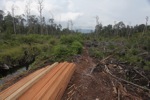The World Wide Fund for Nature (WWF) has announced an independent review of its Global Forest and Trade Network (GFTN) following a report from Global Witness that criticized the conservation organization for working with a number of logging companies that destroy forests, imperil species, and abuse human rights. While WWF’s GTFN is meant to support companies in changing their ways, Global Witness’ report argued that it led to greenwashing forest destruction, including illegal logging.
“GFTN had already scheduled a review of all its activities to take place in 2012,” WWF said in a statement, “but we believe that in view of the current controversy, and in the interests of transparency, it is appropriate to bring it forward. This decision in no way implies that WWF accepts the allegations or recommendations contained in the recent Global Witness [report].”
Global Witness’ report alleged that logging and wood trading companies could take advantage of WWF’s stature to present themselves as ‘green’ without having to make systematic changes to their practices. Furthermore the group criticized the GTFN for what it deemed a lack of transparency, companies allowed to monitor themselves, and a low bar for membership, which has pushed WWF to partner with some of the world’s most notorious logging companies.
However, WWF argues that bar is set purposefully low to allow support for companies most in need of changing. They believe that if enough companies in a particular sector can move toward sustainable practices, it could change transform the way the world extracts resources for the better.
WWF’s GFTN is meant to give a company 5 years to change its ways, however the Global Witness report found that some companies were still involved in destructive activities after ten.
WWF, arguably the world’s most widely known conservation organization, reiterated that they believed that the report ‘contains a number of errors and misleading statements’.
The controversy points to a broader battle in environmental circles regarding how closely environmental and conservation groups should work with some industrial sectors, such as oil and gas, agriculture, mining, and forestry. On the one hand, some environmental groups argue that reaching out to these corporate actors is the best way to make large-scale changes in how environmentally-destructive companies operate. On the other side, is the argument that these companies simply use their partnership with such organizations as PR tools, to paint themselves as caring about the environment without having to make meaningful changes. Aggravating the argument is the fact that many environmental organizations—including WWF—accept donations from destructive companies.
For more information on the Global Witness report and WWF’s reaction: WWF partnering with companies that destroy rainforests, threaten endangered species
Related articles
WWF partnering with companies that destroy rainforests, threaten endangered species

(07/25/2011) Arguably the globe’s most well-known conservation organization, the World Wide Fund for Nature (WWF), has been facilitating illegal logging, vast deforestation, and human rights abuses by pairing up with notorious logging companies in a flagging effort to convert them to greener practices, alleges a new report by Global Witness. Through its program, the Global Forest and Trade Network (GFTN), WWF—known as World Wildlife Fund in the US and Canada—has become entangled with some dubious companies, including one that is imperiling orangutans in Borneo and another which has been accused of human rights abuses in the Congo rainforest. Even with such infractions, these companies are still able to tout connections to WWF and use its popular panda logo. The Global Witness report, entitled Pandering to the Loggers, calls for WWF to make large-scale changes in order to save the credibility of its corporate program.
Fuji Xerox Australia dumps paper supplier accused of rainforest destruction
(08/05/2011) Fuji Xerox Australia have severed ties with Asia Pacific Resources International (APRIL), an paper products giant accused of illegally clearing rainforests in Sumatra for pulp and paper production, reports Nine News.
Australian ‘green’ buildings used illegally logged wood from rainforests allege activists
(07/27/2011) A ‘green’ building development being built by Frasers Property Australia in Sydney has been accused of using illegally-sourced plywood from Malaysian state of Sarawak in Borneo, according to a new Greenpeace report. The wood in question comes from a subsidiary of Samling, a company that has been connected to illegal logging and abusing the rights of indigenous groups in the past. After the revelations came to light, Frasers Property Australia said they would conduct an audit of the wood which was provided to them by Australian Wood Panels (AWP).







